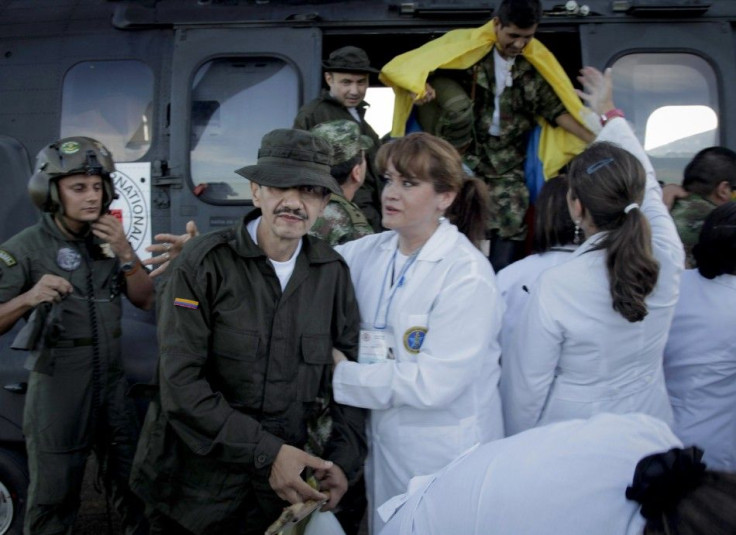Colombian Rebel Group FARC Releases 10 Hostages

Colombia's largest rebel group released its final 10 military hostages on Monday, ending the 14-year-long nightmare for the victims and their families. The last 10 of the non-civilian hostages, four soldiers and six policemen, held captive for 14 years by the group, were picked up by the Red Cross rescue team from an unspecified site in a helicopter provided by the Brazilian government.
The rebel group Revolutionary Armed Forces of Colombia, known by its Spanish initials FARC, has been resorting to kidnapping and drug trafficking to fund its decades-long war against the Colombian government.
The move has raised hopes of a dialogue between the rebels and the government to resolve the long conflict that started in the mid-1960s and has killed thousands.
President Juan Manuel Santos of Colombia hailed the release as an important step for peace talks in a televised interview, but added that it is not enough. He demanded that FARC should release those hundreds of civilian hostages believed to be still in captivity.
It's not sufficient, the nation, the world, demands the liberty of all kidnap victims, Santos said in his speech. I send a salute of freedom to the hostages, freedom that has been a long time coming. Let no one be mistaken. We will continue to fight against violence with all the resources at hand, he said as he vowed to fight the violence, according to a Los Angeles Times report.
The Roman Catholic bishops of Colombia said in a statement Monday that the release was a necessary first step ... to end the scourge of fratricidal conflict and advance on the path to peace.
The hostages were brought to the Villavicencio airport and all of them looked thin and tired but relieved. One of them had brought a wild pig along, apparently a pet, according to the report.
The rebel group in February had promised that they would not resort to anymore kidnapping, but the violence has continued. Both the government and the rebel group had initiated steps to end the conflict in the past, but none were successful.
Analysts say that both sides distrust each other and any concrete solution would require decisive and committed steps from both the parties.
At the very least it's a first step that one should attempt to follow up with other actions on both sides. You want to try and build slowly a set of actions that reflect a greater degree of confidence that permits you to move forward with ways to actually end the conflict, said Mark L. Schneider, senior vice president of the International Crisis Group in Washington, to New York Times.
© Copyright IBTimes 2024. All rights reserved.






















